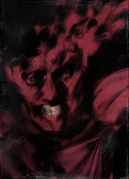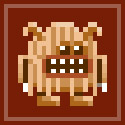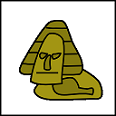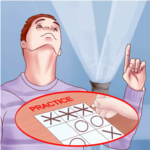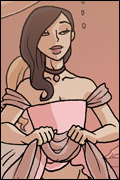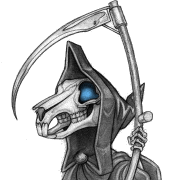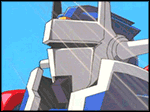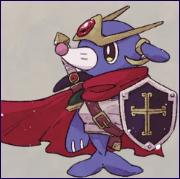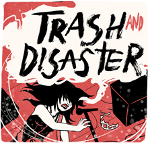|
So real life and work have kept me away from game design for a while (and with it this thread). I just caught up though and all the cool ideas people have been bouncing around have me reinvigorated. I also recently played Galaxy Trucker for the first time, way too late. that also picked my rear end to make a good game or two. Holy poo poo is that a good game, but I digress. I have three games that are complete enough for blind testing. One is a Roman-themed dice game, one is a semi-cooperative political game, and one is a deduction/push-you-luck game based on the film Casablanca. I have a few practical questions about the business side of things: What advice to people have for a con newbie? I've only been to a few cons over the years, and they're not really my thing. But I figured I should get over it if I'm going to be able to network with publishers. Should I get a table of my own to show off my games, or should I find the publisher's corner or whatever? xopods gave out great advice a long time ago here that said (to paraphrase), "small, unestablished game designers should look for small, unestablished publishers. Established designers look for established publishers." Is there a better way than cons to network with small, independent publishers? What advice do people have for blind testing? My thinking is to prepare a note-taking guide to go out with the testing copies. I want the rules and the rule book to speak for itself (otherwise it's not a blind test), but I figured doing the testing group a courtesy by helping them take notes would be a good idea.
|
|
|
|

|
| # ? May 12, 2024 14:42 |
|
I wouldn't get a table unless you have something to sell... the publishers are going to be working their own booths, not going around looking for designers to talk to, so you need to go to them. Aside from cons you can simply surf around on BoardGameGeek to try to find publishers who make games along the lines of the ones you're developing and then check out their websites. If a publisher is interested in taking outside submissions (as opposed to a self-publishing designer who's only releasing his own titles), they'll likely have a link somewhere on their page with information about their submissions policy. Many will just want an email pitch or sell sheet. I think your idea for blind testing sounds good. You could also provide a questionaire with specific questions... if you simply ask people what they thought, many people will give you vague and useless feedback, like "It was fine, but maybe missing something to really make it exciting." Either that or they'll give you prescriptions for what they think should be in the game, when what you really want are descriptions of what's wrong so that you can find the right way to fix the problem. People's suggestions for specific changes are rarely good unless they've played the game repeatedly, as they very likely do not fully understand how the game's mechanics work together after just one play. So you could have a list of questions like:
xopods fucked around with this message at 17:38 on Nov 13, 2013 |
|
|
|
xopods posted:I wouldn't get a table unless you have something to sell... the publishers are going to be working their own booths, not going around looking for designers to talk to, so you need to go to them. That's good, because cons are kind of intimidating. (I'm not a shut-in, I swear. I just don't like cons, specifically.) It's just good to hear that pitching at cons isn't the only or best way to go about business. Edit: That's about what I was thinking for the blind test questionnaire. There's a couple questions there that I hadn't thought of, so thanks again for the help! Railing Kill fucked around with this message at 17:44 on Nov 13, 2013 |
|
|
|
quote:What advice do people have for blind testing? Also, post your rules here. It's easy to miss problems in your own rules, and I like reading rules.
|
|
|
|
This weekend, I participated in a board game design jam. The goal was to have a playable prototype for playtesting by lunchtime Sunday, after which we would invite anyone from the small con the event was hosted within to come play. Our theme was... Cocktail! There were only 5 of us participating, but we split into two groups and started brainstorming. We came up with all sorts of ideas, from the obvious (dice/cards trying to fulfil orders) to the obscure (cockfighting with tails as the prize, drug cocktails, riots with molotov cocktails). Our group settled with a simple concept: the players are a bunch of people on a cocktail crawl around downtown; first to hit all the bars wins. You move around by flicking a disc around the board littered with obstacles and "friends" - neutral pieces used to block and be dicks with. Every time your piece moved and ended a turn on a bar, take a drink. Every few drinks you replaced your disc with a slightly bigger disc. The catch: you only count a bar as visited if your piece ends completely within the boundary of the bar. So it literally gets harder to do as you get more drunk. You stumble around the bar trying to fit your disc completely within its confines so you can finally score it. It worked really well. One of the guys took it home to replace the blocks of index cards with proper wooden buildings. The other group also had a great design. The table plays a simple climbing game taking on the role of rich guests at a cocktail party. One of the players is playing a bartender, trying to serve drinks, but the guests are too snooty/snobby/busy bragging about their lifestyles to actually order the drinks they want. He attempts to serve drink combinations to the guests while they play the climbing game. If the drink matches the secret drink card a guest holds, the bartender scores. If it doesn't match, the guest may push the unwanted drink back, and draw more cards for the climbing game. It created an interesting seperate-but-symbiotic relationship between the two games. The jam was definitely a fun experience! Because of the low-overhead of component design, it was pretty chill and we were out of there by 5pm on both days. I suspect the computer dev jammers next door weren't sleeping much that night after they went home.
|
|
|
|
This thread has inspired me. I've always had an inclination toward designing a game but this discussion put my in all the right directions. I've decided I am going to try getting my feet wet making something for the Piece Pack system (also I wanted an excuse to make a set  ). I went with six suits instead of four as it matches the sides of a d6, this lets me have six sided dice pawns that can be anything instead of just 6 coloured pawns. Has anyone else played with this? It just screamed out at me as the perfect prototyping tool (especially considering the number of games that can be ported to use these generic pieces): ). I went with six suits instead of four as it matches the sides of a d6, this lets me have six sided dice pawns that can be anything instead of just 6 coloured pawns. Has anyone else played with this? It just screamed out at me as the perfect prototyping tool (especially considering the number of games that can be ported to use these generic pieces):
Rutibex fucked around with this message at 22:56 on Nov 21, 2013 |
|
|
|
After playing around with it a bit I found the normal piece pack missing something. Then I found this other ridiculous open source system called Rainbow Deck. Basically the ultimate deck of cards. It has 6 suits, each with light and dark colours. Each card is numbered and has a letter and a d6 roll printed on it too. Perfect except it doesn't map well to the 4 Piece Pack. They are easy enough to modify so I made a 6 suit set using the suits from the Rainbow Deck. I added a bit more though, each tile has a light or dark colour in it's suit as well as a boarder of another suits colour. The arrow in the top left indicated orientation but also indicated if that tile is a "traitor tile". There are 12 "Traitors tiles" in the set and they are indicated by a inverted colour symbol in the upper left. The color distribution/traitors/boarders between suits is not identical, they match up in odd ways. Edit: Cleaned it up a bit. Added colour dice and corner colours to the tiles. Now each tile has three more attributes for potential matching. I'm likely going to do up a Hex Pack mapped into the same system, and I have found a paper craft Icehouse Pyramids set though I don't know exactly how many of those I should make  Now to make the most convoluted game ever Now to make the most convoluted game ever Rainbow Deck: http://boardgamegeek.com/boardgame/59655/rainbow-deck https://www.mediafire.com/?7rz3d12a96m7nsk quote:If you are interested in filler games, or portable boardgames to bring along on travel trips, then the Rainbow Deck is for you! It is basically a 100-games-in-1 cardgame system. Rainbow Piece pack:       Rutibex fucked around with this message at 05:58 on Nov 25, 2013 |
|
|
|
So, I've been dabbling with board game design on and off for about two years, but haven't completed any major projects. I recently started up a new project I think has some potential, and would like some input if anyone is willing to post any! The initial design idea I wanted to explore was "What if there was a strategy game where all players can control the same units?" I have a basic gameplay system laid down, but it's not really enough to carry a game on it's own, so I'm looking for advice on how to flesh it out. I won't go into all of the nitty gritty details, but will list the general game design. The design I came up with is a light strategy game for about 2-4 players with lots of units on the board (which right now is just a simple grid, I haven't decided how I want to flesh it out yet). Thematically, each player is a demon lord that is sending spirits to possess humans (right now my theme is having the humans be high school students, but this could change) on earth in order to cause chaos - whichever demon lord causes the most chaos over the course of the game is declared the winner. The units on the board represent humans, and are represented as such by dice of four different colors - blue, red, green, and purple. The value on each unit die signifies that specific unit's health, and the color represents the clique that the unit belongs to. Each clique (color) has an info card, and will determine what stats units belonging to it has - movement, health, defense, attack, and bonus. Furthermore, each info card details the relationships between the cliques - as units attack against or alongside each other, the relationships between their cliques will deteriorate or improve. Clique relationships will provide bonuses to their respective units when interacting with units of other cliques - units that hate one another get bonuses for attack each other, and units that like each other gain bonuses for attacking in a gang together. At the start of the game, 4 units of each clique are placed on the board, and at the start of their turn each player adds 4 new random units to the board. Each player has a pool of spirit dice, that determine how many units they can control on their turn, and what colors those units may be - the spirit dice use the same dice as units, but are placed off the board in front of each player. On their turn, a player can control one unit for each spirit die they have, and they may only take control of a unit of the same color as the die. So if a player has 2 red dice and 3 green dice, they can control up to 2 red units and 3 green units. The player controls those units for their turn - they can move all their controllable units, and then they can attack with all those units. When a player kills a unit, they remove that unit die from the board and add it to their spirit dice pool with a value of 3, or may instead increase the value of one of their current spirit dice to 6. The specific value of each spirit die represents the player's spirit points. A player may spend 6 points in order to gain a chaos token - and then sacrifices all dice used to pay for this. After the pool of units that players place at the beginning of their turn runs out, the game is over and whichever player has the most chaos tokens is the winner. That's the basic game, and I've been toying with various other systems within the game to flesh it out more, as there isn't much player interaction. My current plan is to have spirit cards - at the start of a player's turn, they draw cards up to the number and color of spirit dice they have, and each card can be used to buff your units (or units that other players are fighting) in battle. Cards would be discarded on your turn in order to take control of units, or saved in order to be played during battle on your turn or on another player's turn. Cards would also have a cost value, that the player would need to pay with spirit points in order to use for combat, or even to take control of a unit of a different color on their turn. I'm not super happy with the card system to promote player interaction, as I know it can be frustrating to always be going into combat not knowing if the enemy player could completely gently caress you over or not - but that is pretty chaotic, which is something the game is more or less trying to promote. Another idea is to have each card also be able to be placed to create a new objective, which could award spirit points, dice, or chaos tokens - and have it so that any player can complete them. The problem I've run into with this is coming up with a variety of objectives - since each player only controls units temporarily, it's difficult to create long-term goals. Most of the objectives would likely result in 'kill x units of y color' or 'get x units of y color to map location z' Basically, I feel like I need to add more resources or objectives to the game, but I'm not entirely sure how to go about doing it with the base system. Oh, and sorry for dumping so much text!
|
|
|
|
quote:Basically, I feel like I need to add more resources or objectives to the game, but I'm not entirely sure how to go about doing it with the base system. It does feel like this will be a core problem in the game - how to promote long-term strategy when your connections to the board state are so fleeting? Especially as you add more people, it feels like the best strategy will often be "score as much as I can, right now", ignoring how you leave the board (the "greedy" algorithm, in algorithm speak). This makes the game into a series of solitaire puzzles that doesn't sound overly interesting. There's a few games you might want to consider that sort of border on this space: Tigris & Euphrates: the game features kingdoms (contiguous populated regions on a grid-of-squares board), but the kingdoms aren't permanently owned by players. Rather, a player might control the farms of one kingdom and the temples of another, while another player controls trading and ruling in the first. Over time, this control of different parts of kingdoms will shuffle around a lot - but having control of various facets of a kingdom will let you harvest various kinds of VP in different ways. T&E is really a beautiful game, and is one spectacular answer to "What if there was a strategy game where all players can control the same units?". I guess it represents kind of a middle ground between a normal war game (with permanent control) and your game idea (where control is, if I understand right, very fleeting). Normally in T&E there will be some ownership that's hotly contested and changing hands continuously, while some regions only change hands (for a given color) a few times in a game. It feels like "possession", thematically, could work really well with this kind of temporary ownership (and there could be fun balancing risks in terms of "what if I build up a super-warrior, but then I get kicked out of his body before next turn?"). Smallworld: I don't like Smallworld, but it does have some interesting ideas. You use a set of units (with varying combinations of characteristics, which is the game's main draw and source of variety) to smash stuff belonging to other players, then you let them "decline" when they're no longer having success. This creates a dynamic board that separates out board state from VP state (ie. you can have the most units on the board, but you're rewarded more for your past violence, not your current dominance). Kemet: Kemet may seem like more of a standard army game, but, again, it rewards violence over dominance. Your units are normally going to be short lived - you send them out to get points and then they'll (almost always) die and you'll make new ones. And you can never have more than 10 or so out at a time. What this ends up meaning is that the "real" board state that you strategize with is mostly how many VP you have, and what upgrades you have (ie. how much beating can you do with your next waves of stuff). I think your game might work best with a kind of similar model: relatively simple tactics, but interesting play in the back in terms of designing your abilities/etc.. jmzero fucked around with this message at 00:54 on Nov 26, 2013 |
|
|
|
Thanks for the recommendations. T&E and Kemet both sound like they're close to what I'm going for, so I'll definitely check out both of them. Kemet in particular sounds like the kind of experience I'm looking for - relatively fast-paced with very fleeting control over the board with extraordinarily expendable units. I do want to encourage players to consider the board state they're leaving, though - I think the fact that if all players have access to the same units then you could very easily purposefully lose fights, move to awkward locations on the board, or any other 'bad' strategic decisions in order to shoot the NEXT player in the foot by sticking him in a lovely position. That was my initial goal with toying with objective ideas - you could try to predict which objectives the enemy would go for, and then choose an objective that would put the units in a position that's favorable to you and unfavorable to an opponent. However, it doesn't feel nearly as good to just gently caress over other players as it does to do something productive for yourself, and I found in the few playtests I've done that players (myself included) would rarely ever take those kind of positions - granted the playtests weren't done with any objectives, but still. It most definitely was a series of solitaire puzzles - and while sometimes the puzzle was 'how can I get points without leaving the board in a position for the next guy to get a lot of points?" it usually was just "how can I get the most points?" So I'm certainly hoping to find a way to remedy that.
|
|
|
|
CodfishCartographer posted:Thanks for the recommendations. T&E and Kemet both sound like they're close to what I'm going for, so I'll definitely check out both of them. Kemet in particular sounds like the kind of experience I'm looking for - relatively fast-paced with very fleeting control over the board with extraordinarily expendable units. Motivating attacks in multiplayer games is tough from a mathematical point of view. If I can gain 2 points in a 4 player game, I move up by 2 points relative to each other player. If I can hurt another player by 4 points, I move up by 4 points relative to one player. Unless I'm sure that one player was in the lead, that is probably worse for me than gaining two vs everybody. Generally, I can help myself, which helps me regardless of how everybody else is doing. Or I can hurt someone else, which helps me only if I pick the right person, but also makes me a target for retaliation. I'm not sure I've ever really seen that solved, although Citadels has a method where you attack a role not a player that at least makes retaliation harder. And choosing the attack roles is actually a very defensive move, since noone else can attack you.
|
|
|
|
Well, while I'm working on straightening out the design for the game a bit more, I figure I may as well bring up two other projects I've worked on - one to get some advice on, and another just to see what you guys think. Hopefully it'll spur a little bit more conversation, as I'm sad I didn't find this thread a year ago when it was bustling. The first originated from the idea of making a strategy game with very few units for each player, rather than a huge army. The system I came up with was each player has three units - a warrior, a mage, and a rogue. Before the game begins, each player selects skillsets for each of their units. So one player's rogue might have an assassination skillset, while the other would have a trapping skillset. The skillsets are where the complexity of the game comes in, as there would be maybe a dozen or so different skillsets for each of the three units. It's up to players to select interesting combinations that complement one another. I've run into a couple issues. The first is that strategic choices are relatively limited once gameplay's gotten going. Selecting complementary skillsets is fun and interesting, but since there aren't many units on the board things get pretty samey pretty quickly. I took a lot of effort to give each class a specific role - mage is for dealing damage, warrior is for defending your units, and rogue is for hindering enemy units - all of the skillsets for each class more or less fulfill these roles. This created some more interesting choices (do I take out their mage, which is the biggest damage threat? or their rogue, which is making life difficult for me), but not really enough I feel. The board is just a simple 7x7 grid, and combat is the sole driving force of the game right now - there aren't any resources to manage aside from unit health and position. I'm not entirely sure if I even want to add resource management, as I enjoy the chess-like aspect of unit selection and positioning being the most important part of the game. The next issue is that once a player is behind, it's very hard to catch up. If a player loses one of their units, they are at a huge disadvantage, and will generally only win if the enemy makes a mistake. The combat and damage system works off of (custom-made) dice-rolls, so there is potential for (un)lucky rolls to even the playing field, but then it'd just relying on luck which isn't much better. My solution to this and the previous issue would be having really short, fast-paced games that focus primarily on the pre-game of drafting skillsets just as much as the game itself, but I'm not sure how well that would go over. Alternatively, increasing the number of units on the board (either by adding more classes of skillsets, or by maybe allowing players to have multiples of the already existing classes) The last issue with this game is that a lot of the interesting effects and abilities are done with counters - and as such, this game would be SWIMMING in tokens and upkeep throughout gameplay. I found that adding a 'timer' to these tokens as well as imposing a limit helped players remember them better: each unit can only have 3 counters on it, and as new ones are added (and at the start of each unit's turn) the counters move one space in the queue, pushing out old counters. This helped the issue, but didn't really solve it. Any suggestions for possible fixes? ------ The next game is one I've just recently come up with, after wanting to make something with a real-time aspect, and a high amount of player politics. The theme is that each player is a politician, riding around on Boston's subway system trying to win approval from the city's citizens. During the day, players travel around the city completing objectives via the city's four main subway lines. Completing objectives gives the player resources - money, supply, or approval - players have a physical time limit in order to complete as many objectives as possible, while also returning to their 'home' station. Any players that don't return to their home station by the time limit will have to lose some of the resources they gathered that day. Then at night, players auction over control of stations, beneficial items, and enacting new ordinances using the resources they gathered during the day - all of these can help them earn or hinder the other players during the following day. Money is used to pay subway fare in order to move around, supply is used to build and upgrade stations, and approval is essentially victory points. Like I mentioned, the daytime phase takes place during real-time. Players move about the board by physically moving train pieces along the lines to pick their player piece up at a station, and then move both to the station they're trying to get to. But each line only has one train at the start, so players may wind up having to wait for others to finish riding. The objectives are simple 'get to this station' goals, that may require a payment, and then reward the player with a resource. Objectives are drawn from a deck of cards and laid out on the table for anyone to complete, but there is 1 fewer objectives than there are players. To further promote player politics, approval tokens are a zero-sum game: the total number of approval tokens are divided equally at the start of the game, and then whenever a player earns tokens, they take them from other players. This is done Ladies-and-Gentlemen-style of peeking under face-down tokens to see what each token's value is. Approval tokens can be worth anywhere from 0-3 approval, and since they're only taken during the day (which has a time limit) it's up to the players to decide if they wanna just grab a 1 token, or spend the time searching for a 3 token that a player may not even have. I haven't run into any major design potholes with this game, which is kind of what worries me - is there something obviously wrong with the design so far that I'm missing? Obviously I haven't gone into too much detail on stuff, but thoughts on the idea would be appreciated.
|
|
|
|
CodfishCartographer posted:Well, while I'm working on straightening out the design for the game a bit more, I figure I may as well bring up two other projects I've worked on - one to get some advice on, and another just to see what you guys think. Hopefully it'll spur a little bit more conversation, as I'm sad I didn't find this thread a year ago when it was bustling. General thoughts: For the falling behind issue, what if you separate "action points" from the actual units? For example, you get 3 "activations" per turn, regardless of how many units you have left (so after losing two characters your last one could do three things a turn)? Losing a character is still a disadvantage but only in losing tactical options. For the memory issues, why not make a hard cap of 1 status effect on a unit at any time, and playing a new one erases the previous? This simplifies bookkeeping but also adds some interesting choices - what do you value most at a given point for a unit, do you spend your unit activations buffing your units or debuffing your opponents, etc. Finally, do you really need dice for combat? Dungeon Command, Dungeon Twister, and Kemet all have non-dice based combat. Gears of War uses a system where cards in hand also represent health, so the more you do the more vulnerable you become. I know that pushes into resource management but mitigates the luck factor and makes it more like chess. If you want to play up the tactical nature, if you haven't done it yet, what about making each ability VERY dependent on range/positioning? As in, (let's assume a hex grid) the Warrior has three abilities, but one only works in front three hexes at range 2, one ability only works in contact but only from side hexes, and he has a defensive ability that only works if his teammates are in his rear arc within 2 spaces.
|
|
|
|
Mostly just posting to say that WoW Arenas: The Board Game sounds pretty fun  . .What about if you had four characters and the fourth one was allowed to enter when the first dies? That way it stays balanced for a little longer, and you have the additional strategy of deciding which three to take first. The fourth could be a healer, perhaps.
|
|
|
|
If the game is a foregone conclusion as soon as one player loses a character, maybe that should be the objective of the game?
|
|
|
|
Morholt posted:If the game is a foregone conclusion as soon as one player loses a character, maybe that should be the objective of the game? I thought about that as a possibility, but didn't think too much on it. Now that you mention it, it actually sounds like it might work out rather well. My main concern with this is that I'd be worried the game would just turn into "Who can burn down the weakest enemy fastest?" But then I suppose it opens up some interesting play with having to put forth effort to effectively protect weakened units while still forming an offensive. Also form a thematic standpoint it doesn't make much sense - just because you lose one unit, why do the others immediately concede? Crackbone posted:General thoughts: I kind of like the idea of action points being separate from the units - it might be a little tricky to work into the system, but I could probably make it happen. Right now, the system is that before gameplay begins players decide which order their units will take, alternating between the players. So Player 1 might move his warrior first, then Player 2 could move her rogue, then Player 1 might move his rogue, then Player 2 chose to move her Mage, etc. This turn order then loops, and is static for the rest of the game. The thought behind this process was to ensure players don't just move all three units at once to instantly focus down one enemy, and to also add a bit of strategy to drafting the turn order - Player 1 will move their mage first, so I may want to put my Rogue immediately after that to keep his other units from being able to support the mage he just moved. The action points idea has got me thinking that maybe instead of drafting individual turns, it would always goes Player 1 then Player 2, and they choose which unit they want to use on that turn. My only problem with that is that players might just only choose one or two units to use every turn, only using the other one or two units in specific niche situations. Or would that be more my responsibility to design each class to constantly be in use all the time? I really like the idea of each unit only being able to have 1 token on it at a time. I'll definitely make that change, and rework the balance to fit into it. I don't absolutely NEED dice for the combat, but I think it works well. Originally I just had flat damage values for abilities, but it just turned into a puzzle of figuring out the most effective numbers, and I found dice fixed that and also made the game more exciting overall. I don't necessarily mind having an aspect of luck in the game, and the design of the dice right now mean they don't have a big swing on the game. Each die reads 0, 1, 1, 2, 2, 3 - designating the number of 'hits', with each hit dealing 1 damage. So a skill could deal 1+2d damage, where it deals a base of 1 damage, and then the user rolls two dice - say they come up as 4, so then the total damage is 5. I have the math for the expected damage values written down on another computer, so unfortunately I don't have them right now. The aspect of luck can create close comebacks, but overall I think the winner comes down far more to strategy than it does who rolls highest. However, the idea of using cards for battle does add in more choices during gameplay, so I'll probably put forth some more thought towards them. I dunno how much I like the added complexity, though. Right now each ability does have a maximum range, to force positioning - also, units have pretty limited movement. Abilities aren't limited to direction facing, though. Which is an interesting idea that I've wanted to mess with - a hex strategy game with very limiting ranges of effects. I might rework the current system to be hex-based so I can get more advanced ranges and areas of effects. It would probably also require a reworking of movement so that the direction a unit faces is actually taken into account, as right now unit direction isn't even a thing.
|
|
|
|
CodfishCartographer posted:I thought about that as a possibility, but didn't think too much on it. Now that you mention it, it actually sounds like it might work out rather well. My main concern with this is that I'd be worried the game would just turn into "Who can burn down the weakest enemy fastest?" But then I suppose it opens up some interesting play with having to put forth effort to effectively protect weakened units while still forming an offensive. Also form a thematic standpoint it doesn't make much sense - just because you lose one unit, why do the others immediately concede? IMO losing after the first character dies means everybody's immediate instinct will be to burn down a single character, and you're going to have a hell of a time fixing that in design. Even if you fix the game so that it's not the best option, it's going to make people frustrated that it's not. Fighting against a player's instinct oftentimes results in them having a bad play experience. quote:The action points idea has got me thinking that maybe instead of drafting individual turns, it would always goes Player 1 then Player 2, and they choose which unit they want to use on that turn. My only problem with that is that players might just only choose one or two units to use every turn, only using the other one or two units in specific niche situations. Or would that be more my responsibility to design each class to constantly be in use all the time? I'd do "rounds", where each round is three activations, but each character must be activated at least once each round. quote:Right now each ability does have a maximum range, to force positioning - also, units have pretty limited movement. Abilities aren't limited to direction facing, though. Which is an interesting idea that I've wanted to mess with - a hex strategy game with very limiting ranges of effects. I might rework the current system to be hex-based so I can get more advanced ranges and areas of effects. It would probably also require a reworking of movement so that the direction a unit faces is actually taken into account, as right now unit direction isn't even a thing. Might be a good idea, as you sound unsatisfied with the actual gameplay depth right now; making positioning more critical should help add depth without having to add more bookkeeping effects.
|
|
|
|
Crackbone posted:IMO losing after the first character dies means everybody's immediate instinct will be to burn down a single character, and you're going to have a hell of a time fixing that in design. Even if you fix the game so that it's not the best option, it's going to make people frustrated that it's not. Fighting against a player's instinct oftentimes results in them having a bad play experience. Hmm, but what would be an easy way to signify the remaining activations, which unit hasn't been activated yet, etc? I'm assuming a round would be P1 Activation 1, P2 Activation 1, P1A2, P2A2, P1A3, P2A3, then would start up a new round, looping back to P1A1. My original idea for showing turn order would have players placing icons representing their units on a turn order tracker at the side of the board at the start of the game. Would I just have players update this tracker at the start of each round? Have them update it as each round plays out? Either seems like a tad bit of a hassle of upkeep. I like the idea as a way of dealing with the problem of falling behind, but not sure how to go about implementing it. I'm still not sure if it would entirely fix the issue (as each class has a very distinct role, so losing it would limit player options) but it will absolutely help it - maybe it would help it enough to not even be THAT big of a problem. Also I'll absolutely start reworking things to be a hex grid rather than squares, and then work in direction as well. Do you have any good examples of games that deal with hex and unit directions well?
|
|
|
|
I've had a minor interest in reviving Slobbovia over the years. The biggest hurdle is that out of the handful of online articles about the game, none of them include rules, maps, or any information that tells you how to actually PLAY the game. Only a few qualifications have made it through in discussions of the player's contributions and broad descriptions of rules that separated Slobbovia from a standard game of Diplomacy. Those include: *The game was a play-by post variant of Allan B. Calhamer's "Diplomacy" *The map used was an original fantasy world, with several expansions over the course of the game *Once a nation reached a certain size, the owner of the country was required to incorporate governors/commanders to assume control of some portion of that nation's army and/or territory. There is no documentation online as to how players were required to divide power, and no record as to what responsibilities each player may have had. *What is mentioned is that commanders/governors are allowed to revolt and defect, either forming their own nations, joining a different nation, or leading a revolution to assume control of the nation they are a part of. *Changes to the ruleset could be voted on by players, most notably the addition and removal of railway companies over the course of the game. *Diplomacy's normal victory conditions were ignored, allowing play to continue indefinitely. The game, and the resulting "shared world" created by the participants of the magazine could arguably be called one of the world's first MMORPGs, with maybe a hundred pages of submitted stories by the players and maybe 3 pages of turn results. Obviously I'm not looking to recreate that sort of success, but trying to emulate the mechanics of the game is certainly interesting enough. But to do that, I need two things: 1.) A decent map generator. I seriously lack artistic skills, and some program that can draw the squiggly bits on borders and coasts would be a huge help. 2.) Some suggestions for writing the rules. I'll hack out a ruleset if anyone is interested in critiquing it, but all too often these things hinge on the map they get played on.
|
|
|
|
|
Triskelli posted:I need two things: While it may not look very pretty, Dwarf Fortress has a pretty robust and realistic map generator that can create a disgustingly huge continent (world?) map that even runs through a simulated history to try and give the place as realistic a feel as possible. While DF may just be done with ASCII art, there are tons of different texture packs available - I assume they work with the map generator, but I don't really know THAT much about them. It might be a good place to start. I don't know a whole lot about Diplomacy, but I'd be happy to add input on any rules that you come up with.
|
|
|
|
CodfishCartographer posted:While it may not look very pretty, Dwarf Fortress has a pretty robust and realistic map generator that can create a disgustingly huge continent (world?) map that even runs through a simulated history to try and give the place as realistic a feel as possible.  TIMGed for loving-huge I didn't do anything to this map. It was generated with the default settings, and is one of the smaller worlds. It's got mountains and valleys, it's got deserts formed by said mountains' rain shadow, it's got rivers with proper flow direction. It's got an ice cap. It's even got a little volcanic island down there on the bottom left. So, yeah, Dorfort is a good map/world maker. (It's also a great game, but, y'know.)
|
|
|
|
Can anyone post some stuff on print and play games? I'm wanting to make a simple one as a portfolio piece, but haven't messed around with them much so I'm not sure what are some good examples of the genre.
|
|
|
|
quote:Can anyone post some stuff on print and play games? Here's a good sample: http://tuesdayknightgames.com/tworoomsandaboom/
|
|
|
|
So, I've been working on some ideas for a game. It's currently warfare-themed, and set in an English village (though this will only affect the instructions) (Working title: The Battle for Little Barkington-upon-Tweed), but that's open to change (pretty much on a whim). I'm working on a 2 player card game, based on Poker (cards have rank/suit; chips are used to represent resources, and are gambled), and also on Magic: The Gathering cube drafting (cards represent units on the battlefield or support abiliities; units have attack/defense values and cash costs, support abilities affect these and have cash costs; cards are accumulated in a draft-like manner to build a deck). The game will work out in two distinct phases: The first phase (War Phase) is a variant on Aces-Low Draft Poker, in which three rounds (First/Second/Third Battle) of heads up poker are played. Player's starting "command post durability" (i.e. starting life total - represented by "Durability Chips") will be the currency gambled, with the winner gaining a stronger footing on which to start the second phase of the game. Each player will start the game with 40 of these, and be encouraged to gamble a portion of these each game. Ante is used to encourage people to actually play rather than folding, and even upon folding, the game will continue (with the first pick alternating, starting with the winning player - to make sure each has enough cards for the second phase). In addition to the suit/value of each card, they will also represent either Infantry Units, Vehicles or Support Abilities. These will be more-or-less sorted in reverse power to the value of the cards being drafted - leading to (hopefully) interesting decisions as to which card to take - aiming to win the battle or win the war (as it were). Cards drafted in each round during phase one are kept by players, building up their deck (similar to an MTG draft), for the second phase. After the War Phase, players will be able to reject some cards from their decks. Although strict penalties for having no cards left should prevent too many cards from being rejected. The second phase (Final Battle) will be played in alternate turns (the initiative will be given to the player with the lowest health). To put units onto the battlefield costs money, represented by cash chips. Each turn, players gain an extra cash chip, thus increasing the amount of £ available (to a limit of £5). Players will draw 4 cards at the start of the game, and start with no cash chips. Units can be played only by the player whose turn it is, whereas support abilities and unit abilities can be used by either player. Players attack each other's command posts (whose durability is represented by the Durability chips gambled for in the first round). Empty decks cost their owner 5 durability per turn, and also (obviously) prevents them from gaining any more cards that turn. Each turn (including the first) will play out the same way:
Variants/alternatives for the first round:
I realise this will probably go no further than shards of paper stuck to bicycle cards, but if it sounds entertaining to anyone, I'll post more about it. And if it turns out really good, I'll possibly kick-start it (though that's a pipe dream at the moment). I just like handling poker chips and gambling for things more important than matchsticks. And interesting draft decisions. Expansions would be pretty simple to make (once I get the basics down) to create 4-way or larger games (could even use a duplicate deck); although this would possibly end up pretty political.
|
|
|
|
I love me some drafting aspects in games, so it does sound interesting. So let me get this straight to make sure I understand - each card represents some kind of unit in a war, and also has a suit + value like poker cards. The usefulness of the unit is inversely proportional to the value of the card itself - so a King could be a puny little footsoldier, whereas a 3 could be a fighter jet - is this correct? And you bet with your health tokens, so players may have to choose between winning a bet for more health token, or taking a unit to be more useful later on once combat starts? This could be an interesting decision, but my initial worry about this would be players just betting really low amounts in order to play it safe, and only go after more powerful units rather than higher ranked cards - as those have more strength in the long-run. Your system for discouraging folding (letting players who haven't folded keep drafting cards) could be really risky. What's stopping a player from just going all-in on a sure-fire hand? If a player folds, then they're getting punished by giving the other tons of free cards. If he doesn't, then he's basically giving up all of his health before the fight even begins. I really really like the idea of gambling with your health points, but you need to be really careful with it. This is something you should probably get playtesting soon, as I could see it becoming an issue - being able to fold is an important part of poker, and limiting that is a huge design decision. As for the second phase, it seems a LOT like MTG. Instead of mana you have cash, and instead of tapping you have ready markers (which function the same as tapping, just with more upkeep). The only other major difference is that there's only one 'main phase' but most MTG players play their cards on the second main phase anyways, so it's not even that large of a change. Really, your second phase is almost exactly the same as MTG, just with only one type of mana and more hassle with dealing with tapped cards. I like your limit of only having 5 "mana" to spend per turn, and I think having such a limited resource pool could lead to some interesting decisions and strategies, but I think you should maybe try to rework the primary system to be a bit more separate from magic. The two phases also seem a bit disconnected at first, but thinking more about it the fact that you're gambling your life points and building your army may provide enough of a link between the two. I want to suggest having them a bit more directly related, like maybe having the card value or suit have some kind of effect in the second phase, but that could devalue trying to pick a good hand in the first phase, which already sounds like it might be a problem - so it might be best not to propagate that further.
|
|
|
|
CodfishCartographer posted:I love me some drafting aspects in games, so it does sound interesting. So let me get this straight to make sure I understand - each card represents some kind of unit in a war, and also has a suit + value like poker cards. The usefulness of the unit is inversely proportional to the value of the card itself - so a King could be a puny little footsoldier, whereas a 3 could be a fighter jet - is this correct? And you bet with your health tokens, so players may have to choose between winning a bet for more health token, or taking a unit to be more useful later on once combat starts? This could be an interesting decision, but my initial worry about this would be players just betting really low amounts in order to play it safe, and only go after more powerful units rather than higher ranked cards - as those have more strength in the long-run. Your system for discouraging folding (letting players who haven't folded keep drafting cards) could be really risky. What's stopping a player from just going all-in on a sure-fire hand? If a player folds, then they're getting punished by giving the other tons of free cards. If he doesn't, then he's basically giving up all of his health before the fight even begins. I really really like the idea of gambling with your health points, but you need to be really careful with it. This is something you should probably get playtesting soon, as I could see it becoming an issue - being able to fold is an important part of poker, and limiting that is a huge design decision. Thank you very much for your thoughts. You've got most of the rules/points right - though the folding rule wouldn't give more cards to the winning player, just "better" ones (i.e. earlier picks). After some preliminary testing, I think the decisions are heavily overloaded onto each drafted card, which causes the decision to be made without considering all the variables (even when testing alone, I was finding it to almost be a coin flip whether to take good cards for the short game or the long game). The whole game started out as a thought experiment about making people want to draft bad cards - to become a game people want to play, I think I need to encourage drafting of good cards and interesting draft decisions. I'm currently considering either letting players bid for cards with their poker winnings, or to re-draft the cards used in each round. I also think you have a point about having card value/suit be important in the second phase (I was also considering making battlefield position important, to try and make the game play out differently to MTG). It's pretty tough to make a second round that takes into account the successes and failures of the first round, while still making both rounds worth playing (either the effect of the first round is trivial, or the effect on the second round is completely destructive).
|
|
|
|
It's ready.Final Attack! Manual posted:You and your peers pilot the K-Machines, powerful, advanced, and ancient battle units that have an elemental affinity and are powered by the Friendship Crystal Drive. The Friendship Crystal Drive itself is the unifying force that allows the K-Machines to combine into Final Kaiser, the legendary fighting robot. Final Kaiser is the world's only hope against the starfaring AI Future AdvaNced Genocider EvolutionaRy (FANGER), whose army of giant, shapeshifting Evolving RoBeasts threaten to destroy civilization. These RoBeasts quickly recover from any damage dealt to them, but the FC Drive itself is the power source for the ultimate weapon, the Final Attack, which is capable of annihilating them in one blow and disintegrating their Evolution Core. Final Attack! is a cooperative game in which you and up to 5 people tied together by fate are pilots of component machines of a multi-part, combining Super Robot. You will do battle against giant monsters who are nearly impervious to all of your weapons except for the all-powerful Final Attack which takes 10 minutes to charge (in real time). The game is played with cards, chips, and an audio soundtrack which serves as an ingame timer and also determines the spread of attacks an enemy will use. If you have PMs and want to playtest a Print N' Play version of this, let me know (post here, I guess!). I'm not quite ready to throw the whole thing into the wild, just yet (although I'll definitely put up a publicly available PnP version later on). The version you will be receiving will be 3-player only and probably locked to the easiest difficulty setting. I'm going to have to iron out the manual before I can get a quote from a manufacturer (!!!) that can determine what my actual budget for printing this game will be (!!!!!). I'll try to start PMing out copies in the next couple days, but if there's a delay it's because I horribly hosed up my 5-month-old playtest audio tracks and I'm remaking all of them from scratch. Broken Loose fucked around with this message at 06:24 on Dec 16, 2013 |
|
|
|
Yo, let me play test BL.
|
|
|
|
First bug found! I forgot to loving put anything about how the game's cooperative anywhere in the manual or in the pitch!
|
|
|
|
I'll play-test it, but I may not get you any feedback till early Jan. If thats ok, I'm in.
|
|
|
|
That sounds amazing, put me down for playtesting as well.
|
|
|
|
modig posted:I'll play-test it, but I may not get you any feedback till early Jan. If thats ok, I'm in. Not really. I was hoping for "within the next couple weeks" as far as getting in games.
|
|
|
|
Please don't tell me you actually only gave yourself a couple weeks to playtest a game.
|
|
|
|
The Leper Colon V posted:Please don't tell me you actually only gave yourself a couple weeks to playtest a game. No. I've been doing heavy playtesting and tweaking for about 6 months now, but the current run of PnP playtests will only be a couple weeks while I redo some huge chunks of the game. If you can't play before January, then just wait for the next version. I hope that makes sense.
|
|
|
|
My group is going to be too inconsistent over the holidays for me to offer testing, but if you PM me a manual I'll read it over (for places that may need rules clarification, etc..)
|
|
|
|
jmzero posted:My group is going to be too inconsistent over the holidays for me to offer testing, but if you PM me a manual I'll read it over (for places that may need rules clarification, etc..) Donezo.
|
|
|
|
I'd love to see the rules, but there's no way I can playtest anytime soon. If there's a useful skill I can offer feel free to ask.
|
|
|
|
Open discussion of things is allowed and encouraged in this thread! Rulebook PM sent, Crackbone. If anything, I need to know if the rulebook is complete as-is and if there are any holes. Most of the huge balance problems have been wiped out (I have some stories for later).
|
|
|
|
I'd love to see a copy of the rules, if you're willing to hand them out to a less-frequent BG Thread poster. With any luck, I might be able to get a group together this weekend.
|
|
|
|

|
| # ? May 12, 2024 14:42 |
|
Just gave them a once-over. First impression is while I get what you're trying to do with the keywords/jargon, it makes the rulebook pretty hard to digest. Given it's not anywhere near finished rulebook, more "finalized" drafts may fix that issue. So this is what your bank robbery game morphed into, I take it?
|
|
|



